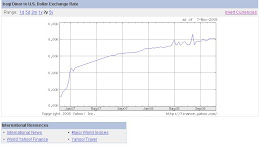Iraq aims to triple oil exports to six million barrels per day (bpd) in 10 years, earmarking $2 billion to start increasing capacity. "We are allocating about $2bn to the Oil Ministry in the next year's budget to start increasing capacity in this sector," Finance Minister Baqer Jabr Solagh said.
"From my view, we need to increase our exports at least to what they were in the 1980s, when we exported 3.4m barrels a day," he said.
Current production stands at some 2.4m bpd, of which 2m are exported.
Solagh pointed out that the oil industry's infrastructure and technology are woefully inadequate, however, and that the aid of foreign companies will be necessary if it is to achieve its goals.
"My view is that we have to deal with international companies, Europeans and Americans, and the others, because our technology... is still old, maybe dating back to the 1970s, as well as the equipment," he said.
"For that I think Iraq needs the help of the international oil companies to enter Iraq and do investment" either through revenue-sharing deals, or simple payment for service.
One such arrangement was concluded on Monday, when Iraq and China National Petroleum Corporation (CNPC) signed a $3bn deal to develop Al Ahdab oilfield in Wasit province for 23 years.
Production is expected to reach 25,000 bpd in the first three years and expand to 115,000 bpd in six years.
While output from the field will be exported, a portion of it will be used to fuel power generation stations nearby to alleviate electricity shortages, it added.
China won the rights to Al Ahdab in a 1997 deal then valued at $700 million, but activities were suspended because of UN sanctions and subsequent security issues following the US-led invasion in 2003.
Baghdad said earlier it had managed to change the previous joint venture contract into a mere service agreement, under which CNPC would charge a service fee of $6 a barrel. The fee will decrease eventually to $3.
In September, Royal Dutch Shell signed a gas joint venture estimated to be worth $4bn, becoming the first Western major to enter Iraq through a deal with Baghdad after nearly four decades.
Former dictator Saddam Hussein threw out foreign oil companies after he nationalised the sector in 1972.
Since his execution in 2006, a number of foreign majors had signed contracts with the government of the Kurdish region in the north, but none with the central government.
( Gulf Daily News )

